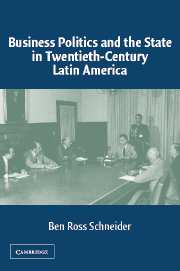Book contents
- Frontmatter
- Contents
- List of Tables
- List of Abbreviations
- Acknowledgments
- PART I INTRODUCTION AND ARGUMENTS
- PART II CASES AND COMPARISONS
- 3 From State to Societal Corporatism in Mexico
- 4 From Corporatism to Reorganized Disarticulation in Brazil
- 5 Business in Colombia: Well Organized and Well Connected
- 6 Consultation and Contention in the Making of Cooperative Capitalism in Chile
- 7 Business Politics in Argentina: Fragmented and Politicized
- PART III IMPLICATIONS AND CONCLUSIONS
- Appendix A Background Information on Major Business Associations
- Appendix B Interviews
- Appendix C Conversions
- References
- Index
7 - Business Politics in Argentina: Fragmented and Politicized
Published online by Cambridge University Press: 23 November 2009
- Frontmatter
- Contents
- List of Tables
- List of Abbreviations
- Acknowledgments
- PART I INTRODUCTION AND ARGUMENTS
- PART II CASES AND COMPARISONS
- 3 From State to Societal Corporatism in Mexico
- 4 From Corporatism to Reorganized Disarticulation in Brazil
- 5 Business in Colombia: Well Organized and Well Connected
- 6 Consultation and Contention in the Making of Cooperative Capitalism in Chile
- 7 Business Politics in Argentina: Fragmented and Politicized
- PART III IMPLICATIONS AND CONCLUSIONS
- Appendix A Background Information on Major Business Associations
- Appendix B Interviews
- Appendix C Conversions
- References
- Index
Summary
If the liberty of association is a fruitful source of advantages and prosperity to some nations, it may be perverted or carried to excess by others, and the element of life may be changed into an element of destruction.
Alexis de Tocqueville, 1835Introduction
Rivalry, politicization, and weak institutional capacity characterize most of the history of business associations, especially encompassing associations, in Argentina. For the second half of the twentieth century the associational domain for business was unstable, partisan, fragmented, and competitive for firms within the same sectors. By the end of the century, the outcomes in terms of organization and business–government relations could hardly have been more different from those in Chile. In contrast to Chile's strong encompassing associations and multiple institutional channels for associations to participate in policy making, Argentina lacked a single stable economy-wide association (despite repeated attempts to create one), and other associations had few consistent channels, either formal or informal, for input into policy making.
Chile, Colombia, and Mexico all tend to the more organized, societal corporatist end of the continuum in Latin America. Brazil and Argentina cluster on the disorganized end of the continuum. Business is disorganized in different ways in Brazil and Argentina, though in both cases mostly as the legacy of meddling by state actors in business organization. In Brazil the distortions of state-regulated corporatism discouraged investment in voluntary encompassing associations. In Argentina state actors, especially in the governments of Juan Perón, rendered business politics more politicized and fluid.
- Type
- Chapter
- Information
- Publisher: Cambridge University PressPrint publication year: 2004



